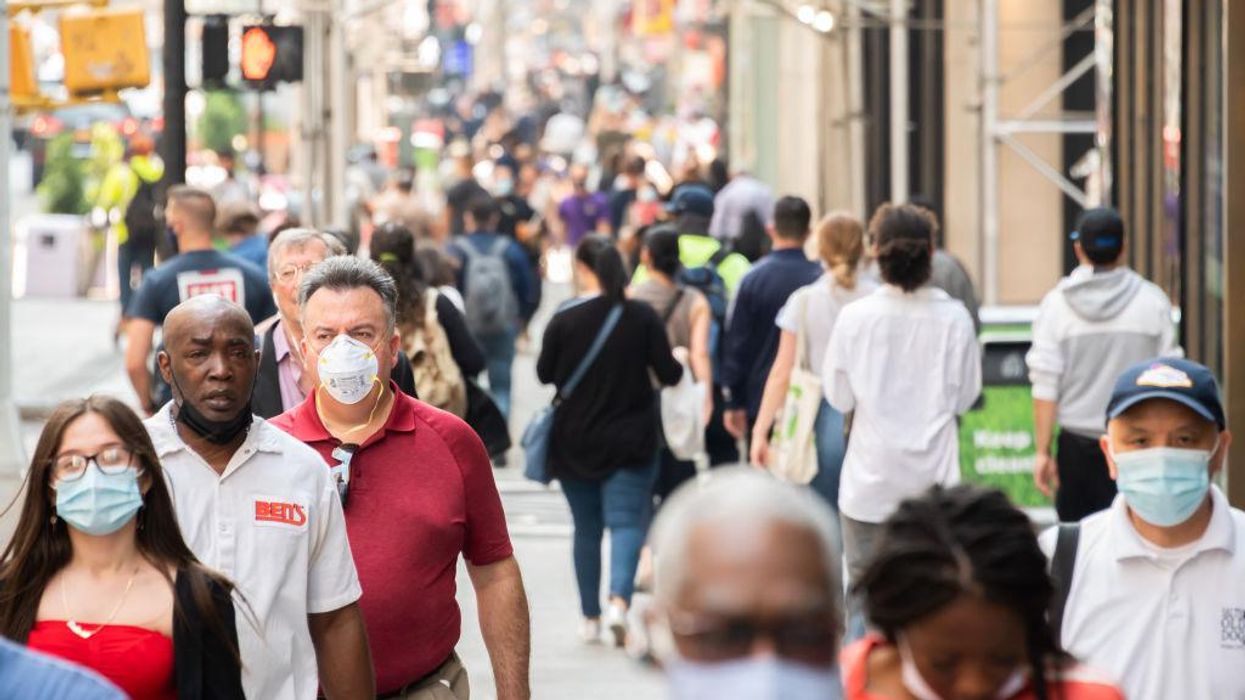
Noam Galai/Getty Images

Preliminary findings from a new study that has yet to be peer-reviewed raise questions about the efficacy of mask-wearing and mask mandates in slowing the spread of COVID-19.
After the onset of the pandemic, scientific experts recommended that people wear face coverings to mitigate the spread of the virus, which can spread via respiratory droplets. No fewer than 40 states followed Centers for Disease Control and Prevention guidance on mask-wearing and adopted statewide mandates requiring residents to wear masks in public.
Researchers at the University of Louisville sought to show that statewide mask mandates and mask use were associated with lower COVID-19 case growth rates in the United States. Instead, they were surprised to discover that while "80% of U.S. states mandated masks during the COVID-19 pandemic" and while "mandates induced greater mask compliance, [they] did not predict lower growth rates when community spread was low (minima) or high (maxima)."
The study relied on CDC data to calculate total COVID-19 case growth and mask use in the U.S.
"We estimated post mask mandate case growth in non-mandate states using median issuance dates of neighboring states with mandates," authors Damian Guerra and Daniel Guerra write.
There are important limitations to note before discussing the study's surprising findings. First, the researchers only analyzed state averages and did not assess counties or localities. Second, data collected from the University of Washington Institute for Health Metrics and Evaluation (IHME) COVID-19 model, which is used to estimate mask-wearing, is subject to survey bias. Third, the study considered confirmed and probable COVID-19 infections to measure spread, but did not assess factors like hospitalizations and mortality.
"Future work is necessary to elucidate better predictors of COVID-19 spread," the authors write.
Acknowledging those limitations, the study concluded that mask use did not observably slow the spread of COVID-19.
"There is inferential but not demonstrable evidence that masks reduce SARS-CoV-2 transmission," the researchers wrote, citing animal models and small case studies. They also pointed out that "masks have generally not protected against other respiratory viruses," citing several studies.
"Our findings do not support the hypothesis that SARS-CoV-2 transmission rates decrease with greater public mask use," the researchers said. "Masks may promote social cohesion as rallying symbols during a pandemic, but risk compensation can also occur."
The study noted mask-wearing comes with the following risks:
Prolonged mask use (>4 hours per day) promotes facial alkalinization and inadvertently encourages dehydration, which in turn can enhance barrier breakdown and bacterial infection risk. British clinicians have reported masks to increase headaches and sweating and decrease cognitive precision. Survey bias notwithstanding, these sequelae are associated with medical errors. By obscuring nonverbal communication, masks interfere with social learning in children. Likewise, masks can distort verbal speech and remove visual cues to the detriment of individuals with hearing loss; clear face-shields improve visual integration, but there is a corresponding loss of sound quality.
Statewide mask mandates enacted in the United States were "poor predictors of COVID-19 spread."
In summary, mask mandates and use were poor predictors of COVID-19 spread in US states. Case growth was independent of mandates at low and high rates of community spread, and mask use did not predict case growth during the Summer or Fall-Winter waves. Strengths of our study include using two mask metrics to evaluate association with COVID-19 growth rates; measuring normalized case growth in mandate and non-mandate states at comparable times to quantify the likely effect of mandates; and deconvolving the effect of mask use by examining case growth in states with variable mask use.
The CDC currently promotes face masks as "a simple barrier to help prevent your respiratory droplets from reaching others" and states "studies show that masks reduce the spray of droplets when worn over the nose and mouth."
Reached for comment, Dr. Guerra told TheBlaze he would prefer to discuss the implications of his findings after the peer review process is completed. He noted that "a number of leading epidemiologists have provided us with positive ad hoc critiques and suggestions" and that he hopes the preprint study "will stimulate productive conversation on this topic."
(h/t: Townhall)